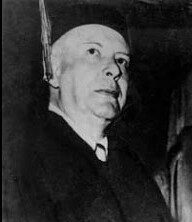"Sunday Morning"
Harmonium (1923)
Contexto: We live in an old chaos of the sun,
Or an old dependency of day and night,
Or island solitude, unsponsored, free,
Of that wide water, inescapable.
Contexto: We live in an old chaos of the sun,
Or an old dependency of day and night,
Or island solitude, unsponsored, free,
Of that wide water, inescapable.
Deer walk upon our mountains, and quail
Whistle about us their spontaneous cries;
Sweet berries ripen in the wilderness;
And, in the isolation of the sky,
At evening, casual flocks of pigeons make
Ambiguous undulations as they sink,
Downward to darkness, on extended wings.
